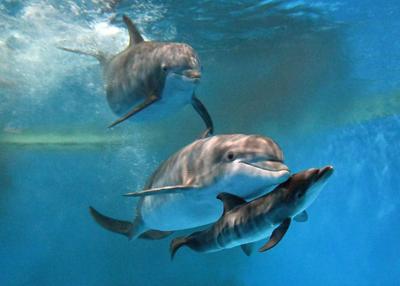A rare wave of excitement is rippling through Brookfield Zoo Chicago after the birth of a bottlenose dolphin calf, the zoo’s first in more than 10 years.
Allie, a 38-year-old dolphin, gave birth to the calf at 12:22 a.m. on Saturday, June 7. The arrival marks a major milestone for the zoo, which last welcomed a dolphin calf in 2014.
“This dolphin birth is a momentous occasion for Brookfield Zoo Chicago,” said Dr. Mike Adkesson, the zoo’s president and CEO, in a press release. “Every birth is a remarkable learning opportunity, and the scientific information we gain benefits marine conservation efforts.”
Veterinarians at the zoo estimate the newborn weighs between 33 and 37 pounds and measures about 115 to 120 centimeters in length. Although still in the early stages of life, both Allie and her calf appear healthy. The zoo’s veterinary and animal care teams are monitoring them around the clock.
The labor began on the morning of Friday, June 6, when Allie’s body temperature dropped, an early sign of impending birth. By 11 p.m., the calf’s tail, or flukes, had emerged. Just over an hour later, the calf was born and took its first breath under the guidance of its mother and Tapeko, another experienced dolphin who assisted during the birth.
“Allie was immediately attentive to her calf and did not require any hands-on care or assistance,” the zoo said in a press release.
Dolphin calves are born after a 12-month gestation period and are fully developed at birth. However, they depend on their mothers for feeding, guidance, and energy conservation. One key behavior observed was “slipstreaming,” where the calf swims in the hydrodynamic wake created by Allie. Staff also documented signs of nursing, a critical early milestone.
The newborn’s dorsal fin and flukes remain soft and will gradually stiffen in the coming days. The calf also displays light vertical lines on its body caused by fetal folding, which typically fade within six months.
“The first 30 days are a critical timeframe for Allie and her calf,” said Dr. Sathya Chinnadurai, senior vice president of animal health, welfare, and science, in a press release. “We’re closely monitoring behaviors and milestones to gauge the calf’s progress.”
In the wild, only about 80% of calves born to first-time mothers survive their first year, the zoo says. Brookfield Zoo is leveraging its decades of expertise to increase those odds, hoping to inform global dolphin care and conservation practices.
The birth also reinforces the zoo’s long-standing leadership in marine mammal research. Its Sarasota Dolphin Research Program, the longest-running dolphin conservation study in the world, and the 2021 Cetacean Welfare Study have both influenced animal care standards globally. The zoo’s recently renovated Seven Seas habitat, which reopened in February after a $10 million upgrade, incorporates findings from these efforts to better support dolphin health.
While the calf’s father has not yet been confirmed, genetic testing is expected in the coming months. A name for the calf will also be announced later this summer. In the meantime, the Seven Seas exhibit will remain closed to the public to allow Allie and her calf to bond.
Other dolphins under the zoo’s care are healthy and temporarily housed in a separate part of the habitat. They will be reintroduced to the new mother and calf when the time is right.








(0) comments
Welcome to the discussion.
Log In
Keep it Clean. Please avoid obscene, vulgar, lewd, racist or sexually-oriented language.
PLEASE TURN OFF YOUR CAPS LOCK.
Don't Threaten. Threats of harming another person will not be tolerated.
Be Truthful. Don't knowingly lie about anyone or anything.
Be Nice. No racism, sexism or any sort of -ism that is degrading to another person.
Be Proactive. Use the 'Report' link on each comment to let us know of abusive posts.
Share with Us. We'd love to hear eyewitness accounts, the history behind an article.